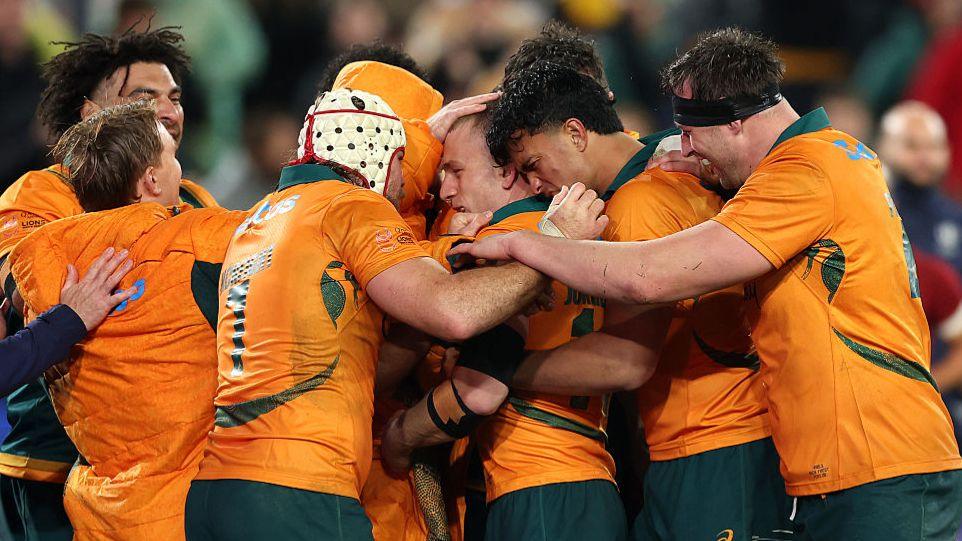In an electrifying display of determination and athleticism, the Australian rugby team, commonly known as the Wallabies, managed to avoid a clean sweep against the British and Irish Lions. This thrilling encounter took place under the torrential rain at the iconic Stadium Australia in Sydney. Despite unfavorable weather conditions and a significant delay due to lightning, the Wallabies delivered a stellar performance that culminated in a final score of 22-12. This match marked the third and final Test of the series, showcasing a bold comeback from the Wallabies after losing the previous match in Melbourne.
The match commenced in heavy rain, creating challenging playing conditions that not only tested the players’ skills but also determined the momentum of the game. The Wallabies were keen to restore their pride after their earlier defeats in the series. They took an early lead with a try by Dylan Pietsch and a penalty from Tom Lynagh, concluding the first half at a promising 8-0. The hosts dominated the initial stages of the game, displaying tactical superiority and forward power that constantly pressured the Lions.
In a match marred by injuries and head injury assessments, key players such as Maro Itoje and Tommy Freeman for the Lions sustained injuries, which altered the dynamics of the game. Lynagh was forced to leave the field due to a head injury after a collision involving Dan Sheehan. A sequence of unfortunate events unfolded when James Ryan, another key player, suffered a serious concussion that triggered a momentary suspension of play for over 40 minutes due to lightning threats.
Returning to the field invigorated, the Wallabies struck again as Max Jorgensen exploited defensive lapses by the Lions, scoring the second try shortly after the resumption of play. With Ben Donaldson successfully converting the try, the score elevated to 15-0, firmly establishing Australian dominance. However, the Lions showed resilience; Jac Morgan’s effort and Finn Russell’s conversion narrowed the deficit to eight points, providing a glimmer of hope.
As tensions mounted, the Wallabies executed a swift response with Tate McDermott capitalizing on a sin-bin situation for the Lions, securing an impressive try. Donaldson’s conversion solidified Australia’s lead at 22-7. The Lions ended the game with a consolation try from Will Stuart, but it served little purpose by that point as the match concluded with a 22-12 victory for Australia—an uplifting finish that provided their supporters a reason to celebrate even amidst a disappointing series outcome.
Throughout the match, heavy rainfall shaped the intensity and physicality of play, creating an aggressive and confrontational atmosphere on the field. The clash was characterized by scrums and fierce tackles, showcasing the raw power of players such as Will Skelton, who was instrumental in maintaining Australian supremacy in the ruck. The Wallabies, particularly throughout the arduous opening half, exhibited remarkable fortitude, grinding out every inch against their illustrious opponents.
From a tactical perspective, the Lions struggled to convert possession into points, primarily due to the formidable Australian defense spearheaded by Nick Frost, who effectively disrupted several lineouts. Despite the Lions’ prior successes in the series, this match demonstrated how a collective effort and spirited performance could reignite the Wallabies’ hope for the future.
In the aftermath of the match, the Lions were left to reflect on a tumultuous end to their tour, having secured a series win but failing to achieve a perfect record against a resurgent Australian side. As for the Wallabies, this victory, filled with grit and an unyielding spirit, may signal a much brighter horizon as they seek to reclaim their top position in international rugby.
In summary, this gripping finale in Sydney was not just about the scoreline; it was a testament to the unpredictability of rugby and the relentless pursuit of excellence that defines the sport. Both teams provided a display that will be talked about for years to come, and for the Wallabies, it underscored the importance of resilience, as they move forward into future challenges with renewed vigor and ambition.












